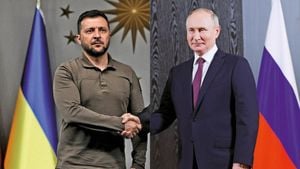Kuwait's economy is at the crossroads, facing both challenges and opportunities as it navigates through the unpredictable waters of global economic shifts. Recent reports portray the nation as one teetering on the edge of necessary reforms and adaptation to survive the volatile oil market conditions.
According to the Kuwait Economic Review, "Kuwait's economic growth outlook reflects diverse challenges and opportunities." These remarks highlight the urgent need for the nation to reassess its reliance on oil revenues, particularly as global energy demands evolve and push for more sustainable alternatives.
The Kuwaiti government's economic strategies are currently under scrutiny, especially as they relate to international trading relationships and investment opportunities. Ahmad Al-Qattan, a well-respected economic analyst, emphasized, "Our dependency on oil revenue needs reevaluation, especially considering global shifts." His observations are echoed by various financial institutions monitoring the region's economic health.
This economic overhaul is not just about addressing present challenges; it's also about leveraging Kuwait's unique position to cultivate new economic avenues. With the rise of digital banking and green energy sectors, the potential for growth appears promising. Officials are working diligently to create frameworks supportive of innovators and entrepreneurs aiming to diversify the economy.
While oil will remain integral to Kuwait's economic framework, the present market offers lessons learned from previous downturns. Countries previously reliant solely on oil, such as Venezuela, have faced significant financial hardships due to fluctuated oil prices. This serves as a cautionary tale for Kuwait, emphasizing the need for strategic planning.
Recent analyses indicate concerns linked to slowing economic growth, paired with predictions of inflationary pressures and fluctuated oil prices. For Kuwait, maintaining economic stability requires careful policy implementations, akin to other Gulf Cooperation Council (GCC) nations diversifying their revenue streams.
Trade relationships are being reassessed, as Kuwait seeks new partnerships across the globe. The government aims to bolster foreign investments by easing restrictions and creating favorable conditions. Strengthening diplomatic ties is also on the agenda, positioning Kuwait favorably within the geopolitical regional trade framework.
Despite these uncertainties, Kuwait's intrinsic economic strength remains notable. The country's strategic geographical position continues to afford opportunities for trade and investment, making it attractive to potential foreign investors.
The coming months will be pivotal as the government outlines its strategy for economic recovery and growth. Amidst uncertainties, Kuwait has the potential to emerge as a competitive player, provided it stays committed to diversification and adapting to the unyielding changes of the global economy.
Moving forward, stakeholders within Kuwait's economy will need to engage actively with the challenges laid before them. With the help of timely international collaborations and skilled workforce training, Kuwait could transform its economic outlook from reliance on oil to fostering sustainable growth through innovation and diversification.
By embracing change and investing strategically, Kuwait can secure its future and embody resilience within the broader economic climate of the Middle East. The call to action for all involved is clear: re-evaluate, innovate, and drive forward toward sustainable development.



